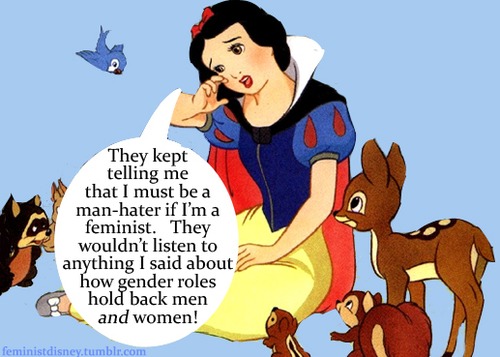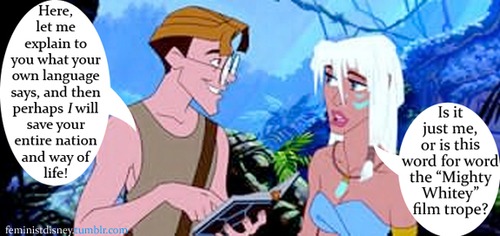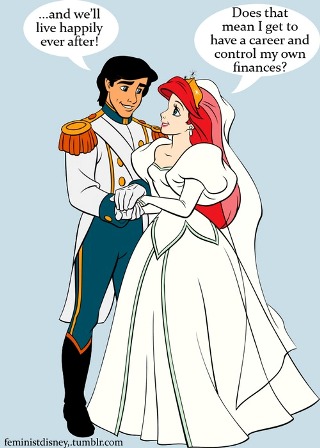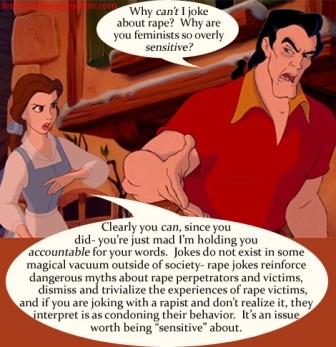feminist disney: a chat with mari rogers

Pocahontas costumes appropriate racial stereotypes. Humour is a tool of oppression. Often, the only fat people on screen are villains. And Lizzie Maguire is still really fun to watch.
Mari Rogers has been running her Feminist Disney blog since 2011, and covers these topics and much more. Through the lens of intersectional feminism, she examines the global conglomerate that seems to own the rights to innocence and femininity. The stand-out tumblr has almost 20,000 followers and Mari posts about pop culture and feminist theory using plain, easy to understand language.
Lip had a quick chat with the awesome blogger.
What’s Feminist Disney all about?
To help educate others with what I know. I guess the end goal is to help unite everyone through our collective knowledge of what is going on with our culture, how we treat each other, how we can facilitate change.
Readers often use the ask box to find out your opinion. What makes you an authority on feminism in popular culture?
I research everything I write about. Which isn’t to say that I’m the last or only source, but I do try to continually dig deeper into every movie, and I try to listen to a lot of other voices. Authority just sort of happens when people continue to listen to you, so I try to be as responsible with that as I can be.
Some people could say you engage intellectually with fluffy, harmless cultural icons. Why do you question Disney so much?
‘If children’s movies, far more than adult movies, present their audiences with role models that are crucial to the development of their own identities, then such issues are of crucial importance.’ – M. Keith Booker, discussing Disney
I’m not a child psychologist but the impact of media on children is very real, and it ties into everything from how they perceive racial differences to how they perceive their own bodies. It’s hardly an accident that 81% of 10-year-olds are afraid of being fat! They pick it up from the media around them, and this distrust of their own skin follows them into adulthood.
I picked Disney because when I started the blog there was really no all-encompassing resource for looking at Disney through that lens. Disney is a great tool because it mirrors the culture around it, and the movies are rich with dialogue and characterisation so it’s easy to point out the issues. People have trouble conceptualising how media shapes our perceptions until you’re like, ‘Hey look at what’s going on here with the lack of fat characters,’ and then they get it, and can’t unsee it.

Do you think the limited portrayal of women can impact our self-conception?
Yes, I think it does affect women’s sense of self when one is constantly portrayed as either “passive,” “the prize,” or both. When I went to see Monsters University, two trailers had a moment where a male character would stop dead in his tracks upon seeing a female character. When this is repeated over and over to kids it does send a message about their “place” in the world.
What are the main ways women are portrayed in Disney films?
I’ll preface this by saying Disney women are diverse in their personalities. I think, though, that if we look at the characters, they’re often the dependable mother, or the frisky love interest. Not that either thing is bad in itself, it’s just sad that in 2013 a movie like Brave is seen as, you know, game changing.
I would just like to see them occupy more roles. Movies like Tangled aren’t afraid to break certain conventions of reality (magical hair, pet chameleon etc), yet women in that film aren’t brawly characters or soldiers.
Can you explain what intersectionality is? Why is it important?
Intersectionality is about examining the intersections of a lot of different issues affecting people and society. For feminism, this means holding up racism, classism, ableism, and transphobia for examination, and to see how they criss-cross life experiences.
Too often feminism is told from the perspective of a white, middle-class, hetero woman, even though we don’t realise it. But this is why dozens of media outlets are willing to run stories about Merida’s re-design, but not Mulan’s.

I love the way you use cartoons or memes to explain complex social theory. What sort of people are these aimed at?
Images are eye catching and if you’re using well-known characters, they sort of force you to see another layer of context. You can victim blame someone for wearing skimpy clothing and getting sexually assaulted – can you say that about Ariel?
The images are aimed at people who would potentially be interested in feminism but they need that door in, to see what context it has in their lives. Disney is in everyone’s lives, so Disney can sometimes be that door.
What did you think of Brave? Is this a way forward for Disney?
Brave is one path of many Disney should be taking. It’s nice to see a female character who is a hero and doesn’t need to be paired up in the end – it’s sad that this is such a distinction. And is the all white cast a way forward? No.
What I like most about Brave though is the emphasis on the mother/child relationship. In the vast majority of children’s films, the love of a mother is usually seen as inherent, while it’s the father’s affections that must be earned. Everything from The Lion King to Tarzan to Hercules. It reflects social perceptions (framed in a hetero relationship context) that motherhood is natural, but a dad that takes care of his kids for any amount of time is a hero. This double standard does a disservice to both parents and often limits the complexity a mother character can be shown to have. And I think Brave rises above that.
Some people believe Joss Whedon is the only one in the entertainment industry writing strong and diverse female characters. Have you got any recommendations for TV series/films which reflect real women?
He’s hardly the only one out there. Orange is the New Black (writer Jenji Kohan) seems like the obvious answer to Joss Whedon. I’m also pretty into The Fosters (who has J.Lo as a producer). I love the way those shows are pretty unapologetic about confronting a whole slew of issues.
What would you like to see Disney do in the next 20 years?
I would love to see prominent Latina characters, LGBTQ characters, and if they keep rolling out the princesses line, some more WoC princesses. I would honestly love if they just made a “heroine” line or something. No matter what the princess line seems stuck on only portraying a single type of femininity. Which is fine, but overwhelming when it’s like, the only product line Disney is presenting and marketing to girls.
I would love to free Mulan from their efforts to continually put her in the matchmaker makeup she didn’t like and instead have a chance to be a doll without the frills.

Check out Mari’s Feminist Disney tumblr here.

